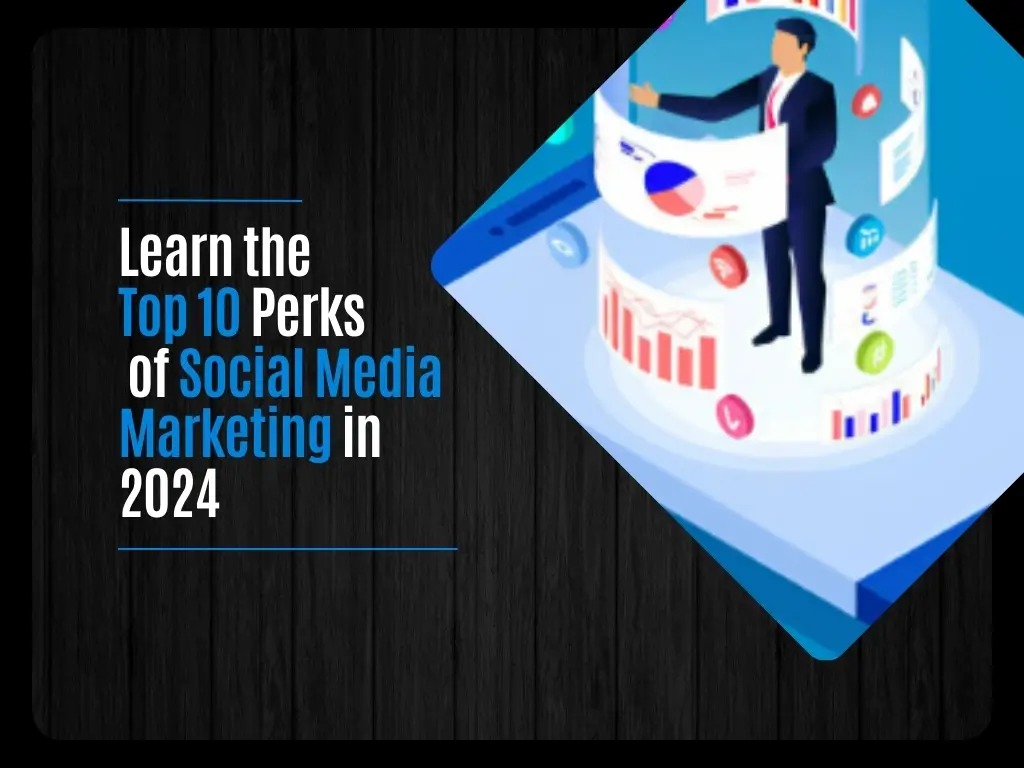Learn the Top 10 Perks of Social Media Marketing in 2024
Discover the top 10 perks of social media marketing in 2025 and learn how it can boost your business growth and online presence.

Introduction
In today’s digital age, social media has revolutionized the way businesses connect with their audiences. Social Media Marketing (SMM) has become a cornerstone of modern marketing strategies, offering unprecedented opportunities for brands to engage, influence, and grow their customer base. From increasing brand awareness to fostering direct customer relationships, the benefits of leveraging social media platforms are vast and impactful.
One of the key tools enhancing the effectiveness of SMM is the Social Media Marketing (SMM) panel. SMM panels streamline the process of acquiring likes, followers, and other forms of engagement, providing marketers with a powerful toolkit to boost visibility and credibility quickly. This blog explores not only the advantages of SMM panels but also delves into the broader benefits that social media marketing offers to businesses of all sizes.
Top 10 Perks of Social Media Marketing
Increased Brand Awareness
One of the primary benefits of social media marketing is its unparalleled ability to increase brand awareness. Social media platforms like Facebook, Instagram, Twitter, and LinkedIn provide businesses with a global stage to showcase their brand identity, products, and services to a vast audience.
How Social Media Boosts Brand Awareness:
- Reach and Exposure: Social media allows businesses to reach millions of users worldwide, regardless of their geographic location. This expansive reach is crucial for brands looking to expand their market presence beyond traditional boundaries.
- Visual Content Impact: Platforms like Instagram and Pinterest thrive on visual content, making them ideal for showcasing products and engaging visual storytelling. Brands can leverage high-quality images, videos, and infographics to capture audience attention and convey their brand message effectively.
- Viral Potential: Social media has the power to turn a single post or campaign into a viral sensation. The ability to share content quickly and widely among users amplifies brand visibility and can lead to exponential growth in audience reach.
Enhanced Brand Loyalty and Engagement
In addition to increasing brand awareness, social media marketing plays a crucial role in enhancing brand loyalty and fostering deeper engagement with your audience.
Building Stronger Customer Relationships:
- Direct Communication: Social media platforms enable direct interaction between brands and consumers, fostering a sense of community and personalized communication. This direct engagement allows businesses to respond promptly to customer inquiries, address concerns, and provide timely customer support.
- Feedback and Insights: Social media acts as a valuable feedback channel, allowing businesses to gather insights directly from their audience. Through comments, messages, and polls, brands can understand customer preferences, expectations, and sentiments, which can inform product development and marketing strategies.
- Creating Brand Advocates: By consistently delivering valuable content and engaging with their audience authentically, brands can turn satisfied customers into loyal advocates. These advocates are more likely to share positive experiences with their networks, amplifying brand reach and credibility.
Cost-Effectiveness
One of the most appealing aspects of social media marketing for businesses, especially small to medium-sized enterprises (SMEs), is its cost-effectiveness compared to traditional marketing channels.
Advantages of Cost-Effective Social Media Marketing:
- Minimal Financial Investment: Creating a business profile on most social media platforms is free, allowing businesses to establish an online presence without upfront costs.
- Targeted Advertising: Social media platforms offer advanced targeting options based on demographics, interests, behaviors, and location. This precision targeting ensures that marketing budgets are spent on reaching the most relevant audience, maximizing ROI.
- Pay-Per-Click (PPC) Advertising: Platforms like Facebook Ads and LinkedIn Ads operate on a PPC model, where advertisers only pay when users interact with their ads (e.g., clicks, likes, shares). This pay-for-performance model minimizes wasted ad spend.
- Cost-Effective Content Distribution: Sharing content organically on social media helps businesses amplify their reach without additional costs. By creating shareable content that resonates with their audience, businesses can achieve viral growth without hefty advertising budgets.
Targeted Advertising Options
One of the standout advantages of social media marketing is its ability to offer highly targeted advertising options, allowing businesses to reach specific demographics, interests, and behaviors with precision.
Precision Targeting Capabilities:
- Demographic Targeting: Social media platforms allow advertisers to target users based on demographic factors such as age, gender, income level, education, and marital status. This ensures that marketing messages resonate with the intended audience.
- Interest-Based Targeting: Platforms analyze user interests and behaviors to deliver ads tailored to their preferences. Businesses can target users interested in specific topics, hobbies, or industries relevant to their products or services.
- Behavioral Targeting: Utilizing data on user behaviors such as purchase history, website visits, and interaction with ads, businesses can refine their targeting to reach users likely to convert into customers.
- Geo-Targeting: Local businesses can leverage geo-targeting to reach users based on their geographical location. This is particularly beneficial for promoting local events, offers, and services to a relevant audience.
Improved Customer Insights
Social media marketing provides businesses with valuable insights into customer preferences, behaviors, and sentiments, enabling them to make informed decisions and optimize their marketing strategies.
Gathering Actionable Data:
- Social Listening: Monitoring conversations and mentions about your brand on social media platforms allows businesses to understand customer sentiment and gather real-time feedback. This social listening helps identify trends, address customer concerns promptly, and capitalize on positive feedback.
- Audience Analytics: Social media platforms offer analytics tools that provide deep insights into audience demographics, engagement metrics, and content performance. Businesses can analyze these metrics to refine targeting, optimize content strategies, and measure campaign effectiveness.
- Competitor Analysis: Social media provides visibility into competitors’ activities, allowing businesses to benchmark their performance, identify competitive advantages, and capitalize on market opportunities.
Increased Website Traffic and SEO Rankings
Social media marketing plays a pivotal role in driving traffic to your website and boosting search engine optimization (SEO) efforts, contributing to enhanced online visibility and organic growth.
Driving Traffic through Social Channels:
- Content Distribution: Sharing blog posts, articles, videos, and other content on social media channels drives traffic to your website. Compelling and shareable content encourages users to click through to your website to learn more.
- Call-to-Action (CTA) Integration: Including CTAs in social media posts prompts users to visit your website, sign up for newsletters, download resources, or make purchases, driving targeted traffic directly to relevant landing pages.
- Referral Traffic: Social media platforms act as referral sources, with users clicking on links shared by their network. This referral traffic can lead to increased page views, longer session durations, and higher engagement metrics on your website.
Boosting SEO Efforts:
- Social Signals: Engagement metrics such as likes, shares, and comments on social media posts contribute to social signals, which search engines like Google consider in their ranking algorithms. Higher social engagement can positively impact SEO rankings.
- Backlinks and Authority: Sharing valuable content on social media encourages backlinks from other websites and influencers, enhancing your website’s authority and credibility in the eyes of search engines.
- Brand Visibility: Active social media presence increases brand mentions and visibility across the web, which can lead to more branded searches and improved organic search rankings for relevant keywords.
Real-Time Customer Service
Social media platforms serve as valuable channels for providing real-time customer service and support, enabling businesses to engage directly with customers and address inquiries, concerns, and feedback promptly.
Benefits of Real-Time Customer Service:
- Immediate Response: Customers expect timely responses on social media, making it essential for businesses to monitor and respond to messages, comments, and mentions promptly. This responsiveness demonstrates commitment to customer satisfaction.
- Issue Resolution: Social media allows businesses to address customer issues publicly or privately, depending on the nature of the inquiry. Resolving issues transparently can enhance customer trust and loyalty.
- Personalized Interaction: Direct messaging and personalized responses on social media enable businesses to engage with customers on a one-on-one basis, fostering a positive customer experience and building stronger relationships.
- 24/7 Availability: Unlike traditional customer service channels with limited hours, social media platforms operate 24/7, providing customers with access to support whenever they need it.
Competitive Edge and Market Intelligence
Social media marketing provides businesses with valuable insights into competitors’ activities, industry trends, and market dynamics, empowering them to stay competitive and adapt their strategies effectively.
Leveraging Competitive Analysis:
- Monitoring Competitor Activities: Social media platforms offer visibility into competitors’ content strategies, promotions, and customer engagement tactics. Analyzing competitors’ social media presence helps businesses identify opportunities, differentiate their offerings, and stay ahead in the market.
- Benchmarking Performance: Comparing key metrics such as follower growth, engagement rates, and content effectiveness against competitors provides benchmarks for assessing performance and setting realistic goals.
- Identifying Market Trends: Social media serves as a hub for industry discussions, consumer sentiments, and emerging trends. By monitoring conversations and hashtags related to their industry, businesses can identify market trends early and capitalize on opportunities.
- Adapting Strategies: Insights gathered from competitive analysis and market intelligence enable businesses to refine their marketing strategies, optimize campaign performance, and adjust tactics in response to changing market conditions.
Enhanced Brand Authority and Thought Leadership
Social media marketing allows businesses to establish and enhance their brand authority and position themselves as thought leaders within their industry.
Building Brand Authority:
- Content Curation and Sharing: Regularly sharing high-quality content, industry insights, and thought-provoking articles on social media establishes credibility and expertise. By providing valuable information to their audience, businesses can position themselves as trusted authorities in their field.
- Educational Content: Creating and sharing educational content such as guides, tutorials, and webinars demonstrates expertise and offers practical solutions to audience pain points. This positions businesses as valuable resources and enhances brand authority.
- Engagement with Industry Influencers: Collaborating with industry influencers and thought leaders through social media partnerships, guest posts, or interviews enhances brand visibility and credibility. Associating with respected figures in the industry can elevate brand authority.
Measurable Results and ROI
One of the significant advantages of social media marketing is its ability to deliver measurable results and provide a clear return on investment (ROI) for businesses.
Tracking and Analytics:
- Performance Metrics: Social media platforms offer robust analytics tools that track key performance indicators (KPIs) such as engagement metrics (likes, shares, comments), reach, impressions, click-through rates (CTR), conversion rates, and more.
- Campaign Performance: Businesses can measure the effectiveness of their social media campaigns in real-time, allowing them to optimize strategies, allocate budgets effectively, and make data-driven decisions.
- Attribution Models: Utilizing attribution models such as first-click, last-click, or multi-touch attribution helps businesses understand the impact of social media on customer journey stages and conversion paths.
- A/B Testing: Experimenting with different ad formats, targeting options, and content variations enables businesses to identify best-performing strategies and optimize campaign performance for maximum ROI.
The Use of SMM Panels in Social Media Marketing
Social Media Marketing (SMM) panels, also known as Social Media Marketing panels, are tools that streamline the process of purchasing social media engagement, such as increasing social media platforms likes, followers, views, and comments. You can use these panels to increase your Tiktok likes, Instagram followers, YouTube subscribers and more. These panels are popular among businesses, influencers, and individuals seeking to enhance their social media presence quickly and efficiently.
How SMM Panels Work:
- Automated Services: SMM panels connect users with a network of suppliers who offer social media engagement services. These services are often automated, allowing users to select and purchase likes, followers, or other forms of engagement for their social media profiles.
- Wide Range of Services: SMM panels typically offer a wide range of services tailored to different social media platforms like Instagram, Facebook, Twitter, YouTube, and TikTok. Users can choose services based on their specific needs and goals.
- Instant Delivery: One of the key advantages of SMM panels is their ability to deliver social media engagement almost instantly. This rapid delivery can help businesses and individuals boost their visibility and credibility on social media platforms quickly.
- Cost-Effectiveness: SMM panels often provide services at competitive prices, making it cost-effective for users to increase their social media following or engagement without investing significant time or resources in organic growth strategies.
Benefits of Using SMM Panels:
- Enhanced Social Proof: A higher number of likes, followers, or views can enhance social proof, making profiles appear more popular and trustworthy to potential followers or customers.
- Time Efficiency: SMM panels save time by automating the process of acquiring social media engagement, allowing users to focus on other aspects of their marketing strategy or content creation.
- Targeted Growth: Users can target specific demographics or audiences by purchasing engagement tailored to their target market, enhancing the effectiveness of their social media campaigns.
Considerations and Best Practices:
- Quality vs. Quantity: While SMM panels offer quick results, the quality of engagement (e.g., real vs. bot followers) and long-term sustainability should be considered. High-quality engagement is crucial for building genuine relationships and trust with your audience.
- Compliance: Users should adhere to social media platform guidelines and terms of service when using SMM panels to avoid penalties or account restrictions.
- Integration with Strategy: SMM panels should complement an overall social media marketing strategy. They can be used strategically to kickstart growth, amplify content reach, or enhance visibility during promotional campaigns.
Conclusion: Harnessing the Power of Social Media Marketing
Social media marketing presents businesses with unparalleled opportunities to enhance brand visibility, engage with their audience, drive traffic, and achieve measurable results. By leveraging the diverse capabilities of social media platforms, businesses can build strong customer relationships, establish authority in their industry, and stay competitive in a dynamic digital landscape.
As businesses navigate the digital landscape, embracing social media marketing is not just advantageous but essential for sustainable growth and success. By consistently delivering valuable content, engaging authentically with their audience, and leveraging analytics to refine strategies, businesses can harness the power of social media to achieve their marketing goals effectively.



